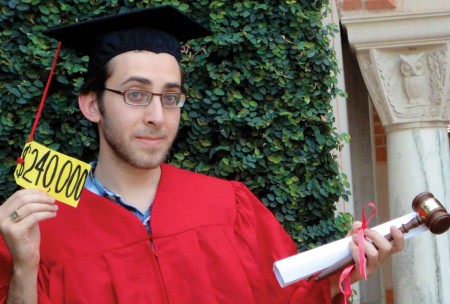Mailbag - February 2014

Evan Mintz said Rice University and Cardozo School of Law in New York were affordable, despite this 2011 photo spoof, thanks to then-lower tuition, the Texas Tomorrow Fund, a National Merit Scholarship, a law-school scholarship and parents who helped pay off his loans.
Details matter
Thank you for this very insightful article (Affording College, by Cheryl Laird, January 2014). I really appreciated the details and specific action items listed. Most articles regarding preparing for college are vague and high level and don’t provide any insight into a very daunting process. They simply tell the reader to do research. This article went above and beyond and actually listed very specific action items and examples. Thank you for a great article.
Cecilia Heilmann
Everybody read it
The response to the trading article (Digital Garage Sale, by Annie Blaylock McQueen, January 2014) has been tremendous! Literally, I have received at least 75-100+ requests per day to be a member of the [Facebook West University Trading] site. Thank you, Annie, for a great article and an interest in our community.
Jackie Sharbrough
Breastmilk sharing risky
Your recent article on digital garage sales implied that sharing breastmilk with friends and neighbors is a good thing: “The group has come in handy for locating nearly impossible-to-find items, like breast milk. There was a mom who was looking for breast milk for a premature baby. At the time I had a three-month supply in our freezer. She was looking to buy it. I just gave it to her.” Nothing could be further from the truth.
Breastmilk sharing is risky because breastmilk is a body fluid and may contain the same infectious agents that blood products can contain – hepatitis, HIV, CMV and others – and it is important to understand that unless you have donors who are screened with bloodwork, and the milk is pasteurized, you put your baby at risk by using the milk from your generous neighbor, and the neighbor puts herself at risk of being blamed for illness in the recipient baby. Most individuals who are CMV carriers do not know it, even if they are regular blood donors. I am sure that the recipient of the breastmilk in question did not ask the generous donor to get bloodwork before she accepted the offer of free milk.
You owe it to the many young mothers who would do anything to promote the health of their infants to correct this misperception in your next issue and in your online edition. There are many online sources of breastmilk, and this is an area of increasing concern, as families are now freely sharing breastmilk with others and promoting its benefits. A recent study presented at the Academy of Breastfeeding medicine showed that most if not all of these online sources of breastmilk shipped the milk improperly and that received milk not only had high levels of bacterial contamination, but often was received at room temperature and/or in leaking containers.
Encourage women with extra breastmilk to donate to the Milk Bank in Austin [milkbank.org] or join the Mother’s Milk Cooperative (www.mothersmilk.coop), where donors are screened and milk is processed to remove the risk of infection instead. In addition, these organizations make sure that donor milk is available to the most vulnerable of infants, the very low birthweight infants whose own mothers are unable to produce sufficient milk to nourish them, the infants who are most likely to die from formula-related illness, such as necrotizing enterocolitis.
Melanie Mouzoon, M.D.
Correction
In January’s Tanglewood/River Oaks Buzz About Town column, Ed Wolff was misidentified as Beth Wolff’s husband. Beth and her son, Ed Wolff, were co-chairs of the Houston A+ Challenge Power of Network Dinner. The Buzz regrets the error.
Send letters to [email protected]. Please include your name, address, phone number and email address for verification purposes. Letters are subject to editing for clarity and space. Views expressed in letters do not necessarily reflect the opinions of The Buzz Magazines, and The Buzz takes no responsibility for the content and opinions expressed in them.
Want more buzz like this? Sign up for our Morning Buzz emails.
To leave a comment, please log in or create an account with The Buzz Magazines, Disqus, Facebook, or Twitter. Or you may post as a guest.


